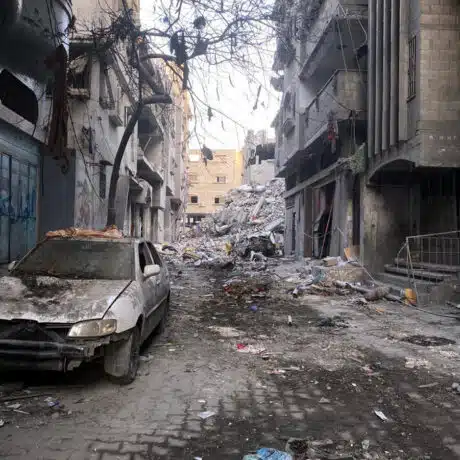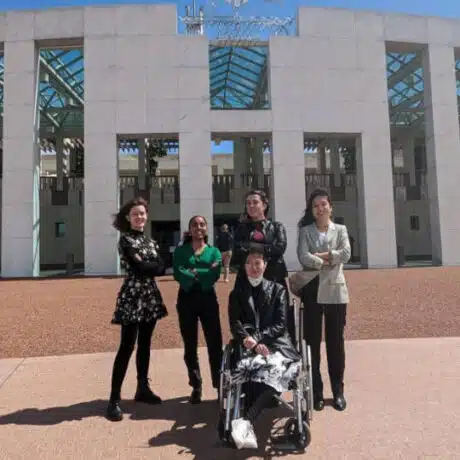News and Stories - Advocacy - 16 March 2017
How far we’ve come
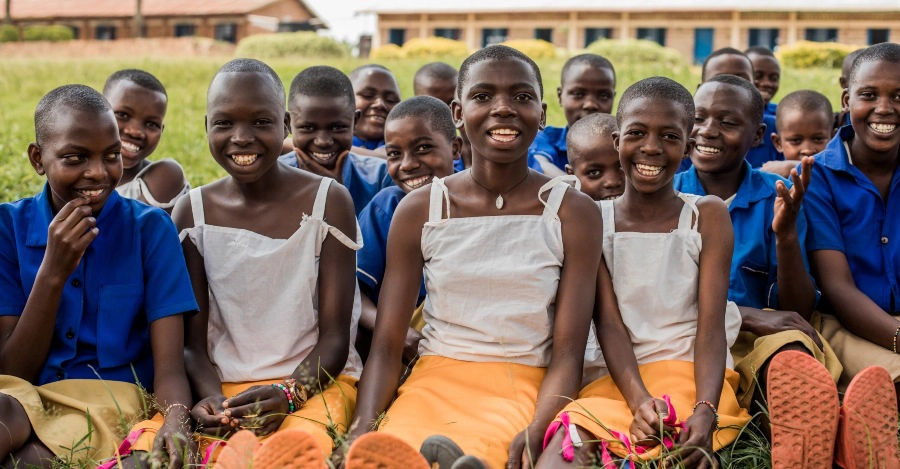
In 1937 Plan International was born in the midst of the Spanish Civil War which saw refugee and orphaned children largely overlooked. 80 years on in an ever-changing and even more complex world, we reflect on what we’ve learnt, how we’ve grown and our hope for children and young people into the future.
Today we reach an exciting milestone. 80 years of working with children across the globe to overcome the effects of war, poverty, disaster, discrimination and marginalisation. With a band of loyal supporters and partners, exceptional children and young people, and a dedicated team behind us we’ve supported millions of children and their communities to not just survive but thrive in a fairer world.
It’s natural though to wonder if we’re still around 80 years after our foundation, have we really done our job? And does our history and experience place us as experts in our field or does it hold us back in a rapidly changing world?
We took this opportunity to deep-dive into our history, our challenges, our hard decisions and our triumphs. What follows showcases just how much we and the world around us have transformed in the last 80 years.
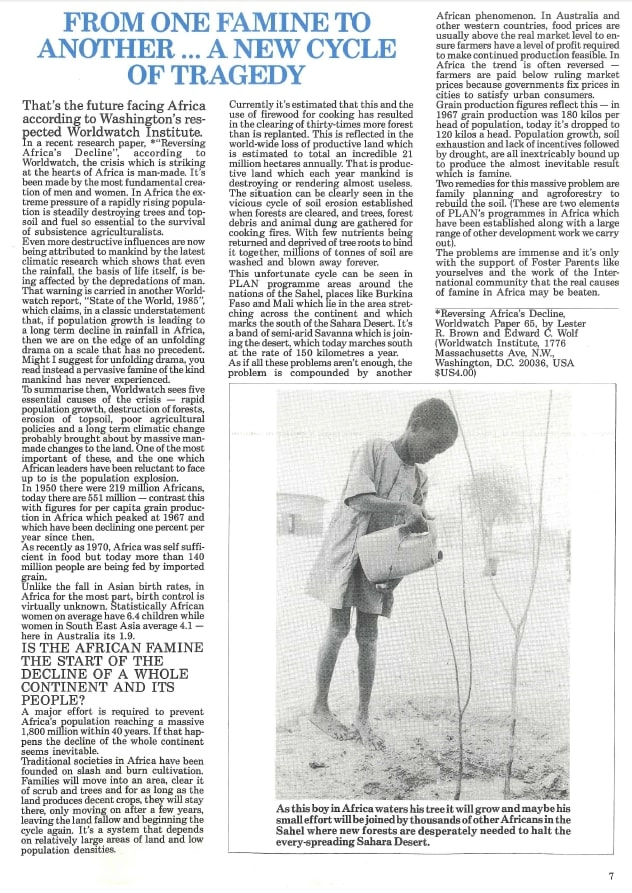
This piece on famine in Africa and the ‘cycle of tragedy’ appears in the September 1985 issue of ‘Foster Parents PLAN News.’ It asks ‘Is the African famine the start of the decline of the whole continent and its people?’ With famine recently declared in South Sudan and others in the region at high risk of following suit, it can be easy to ask – have we really made any progress at all? While the story might seem the same, the world is a different place. Read on to find out more.
A world transformed
Plan has seen so many big global changes and adapted to them all.Our Australian CEO from 2001 – 2018, Ian Wishart is well placed to reflect on our history. Having spent almost 30 years in international development he’s borne witness to some of the most substantial changes and challenges we’ve faced.
It’s a natural assumption for many of us to attribute the work of NGOs to ‘developing’ countries primarily in Asia and Africa. But our inception is tied to Europe, starting in Spain during the civil war and then Europe more broadly with the Second World War. It’s important to realise this because it shows just how much the world has changed in that time.
“I think the biggest shift in the last 80 years was firstly peace in Western Europe – a lasting peace in Western Europe – because we were born in that conflict. Post the Second World War Western Europe really remained at peace and progress was tremendous.” Ian suggests.
We may be 80 years old, but we set our foundations as trailblazers in our field even then. “Right from the beginning Plan was interested in how children develop and how children are impacted by the experiences of war and trauma and poverty. Sigmund Freud’s daughter Anna Freud was very involved in studying how children were affected by the war and some of the earliest work on children in war was done by her, working in partnership with Plan International. So the idea of children’s development sitting alongside community development has been part of our history.”
There is an important thread that comes through in all of our work, our ability to lead and to learn. As our organisation grew, and the world changed, so too did our understanding of how to best serve children.
“Gradually we saw the need for helping children in developing countries and so we expanded into Latin America and Asia and eventually Africa so there’s been a lot of change from emergency response to long term development.” Ian explains.
It was as we turned our focus to Asia that our approach started to shift substantially. We had a dig through Plan International’s history (then ‘Foster Parents PLAN’) which is outlined in the book ‘For Common Decency: The History of Foster Parents Plan’. It outlines the change that took place as we started working in the region:
Programs in the Republics of Korea, Vietnam, and the Philippines are particularly interesting. Their histories illustrate the evolution and cultural adaptability of PLAN’s philosophy of assistance as development ideas changed and as these countries themselves changed.[1]
Our work in Korea was particularly transformative as our approach changed from a child relief and welfare agency to a development agency that involved children, their families and entire communities in the development process. Our Korean program lasted 26 years and while the initial prospect drew this response from one of the directors:
“Heaven help us—it will be some headache.”[2]
It went on to be a highly regarded program that saw a successful handover from Plan to the Korean government.
In June 1979 the process was completed and PLAN’s 26-year program of service to needy children, their families, and their communities in the Republic of Korea came to an end.[3]
Similarly in Hong Kong where we had worked since 1959 we were able to step aside with the country’s government fully equipped to cater to its own people.
“Hong Kong now truly is able to take care of its poor, and … there is no further need for a PLAN program here.”[4]
Yet in times of conflict, our ability to support those children who need it most can be out of our hands. The Vietnam War saw us forced to withdraw from the country after the fall of the Thieu regime in 1975.
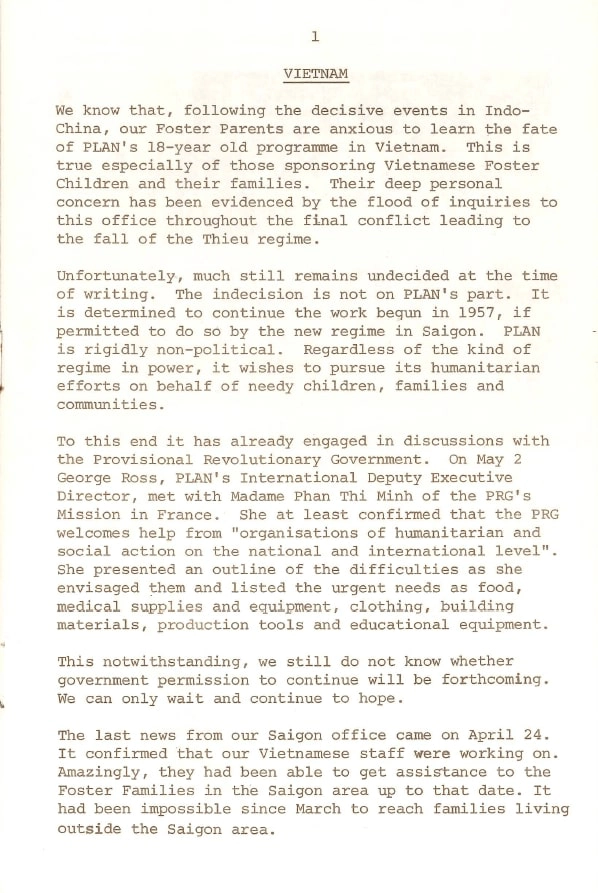
Peace matters
Ian draws on the emergence of countries like China and India, Malaysia, Thailand, Korea as the second substantial change that the world has encountered over the last 80 years. “These countries have all come out of developing country cases or war situations and their economies are now very strong. They’re part of the new world and in the process of that millions and millions of people, in fact billions of people, have come out of poverty.
“It’s only come from two reasons in my view: one is there’s been the green revolution in Asia which allowed agriculture to develop rapidly and the second reason was there was significant foreign investment either commercially or through overseas aid. And I might add that in the last 30 years there’s been relative peace in East Asia or Asia in general, which has enabled all of that to progress. We’d like to see those conditions in Africa and other parts of the world because we can see that so much progress can be made if the right conditions are there.”
Just as we saw in Europe after the Second World War, relative peace and stability has played an important role in enabling people across Asia to thrive economically. No matter what work we do and what foundations we lay for children and communities, it can all be undone through conflict. With an increasingly unstable world, this is a huge concern.
“My biggest concerns at the moment are conflict and climate change. I’ve seen too many times where war has set back development by decades, destroying housing, infrastructure, schools, ruining children’s lives.” Ian reflects. “I’m really worried about the build-up of spending on arms, the sabre-rattling, the wars that seem to break out and cause tremendous harm.
I’d like to see a lot more money on peace building and development than is on weapons of destruction.Just as impactful is the stability of our environment. As drought ravages parts of Africa and extreme weather events leave our poorest neighbours vulnerable to life-threatening disasters our inaction on climate change is unacceptable. “We need to get on top of climate change because if we don’t, climate change is likely to have a rolling back effect on development, particularly on the poorest countries in the world. It’s well known that climate change will impact poor countries the worst and the fastest and those are the communities that can least afford financially, physically, agriculturally to suffer these setbacks.”
Ian adds “The world is now a very small village and all of us have to work together to create a world that’s liveable. Unfortunately we still see too much individual thinking by countries rather than a sense of what’s good for everyone. We keep on doing our work to push back poverty and help children but if the countervailing forces of conflict and climate change are too great then we’re going to be overwhelmed and I don’t want that to happen.”
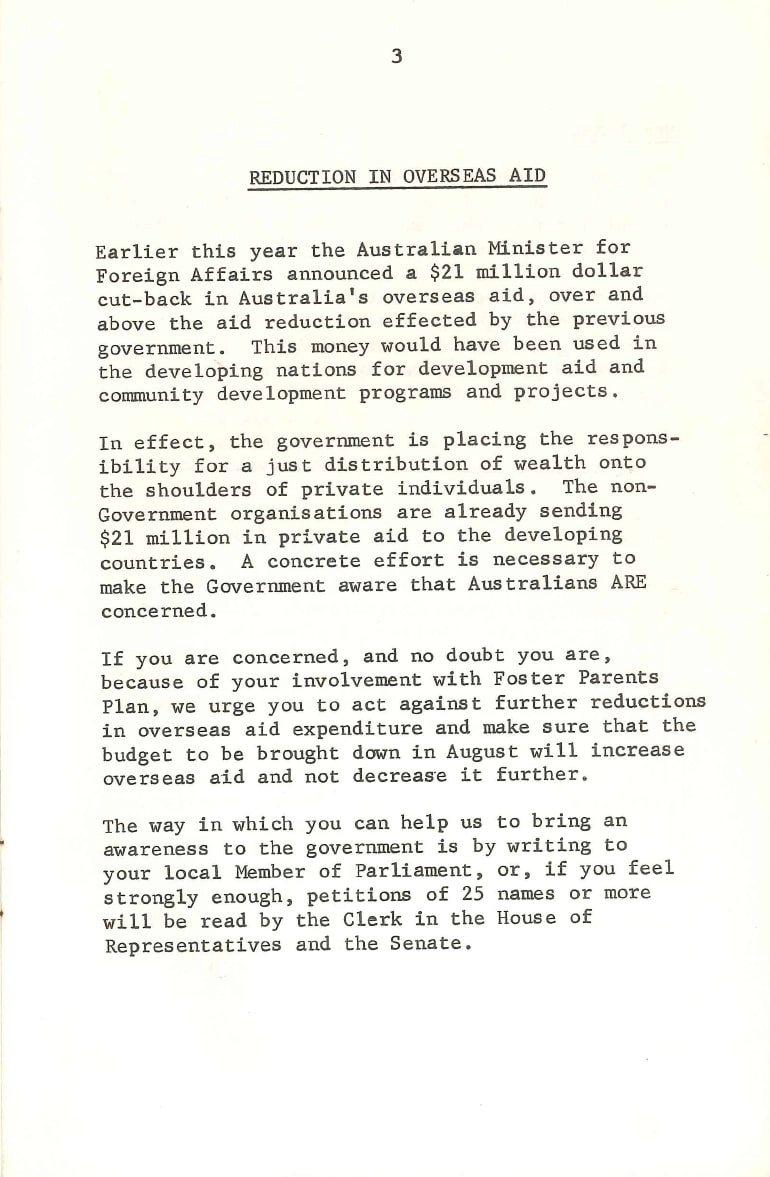
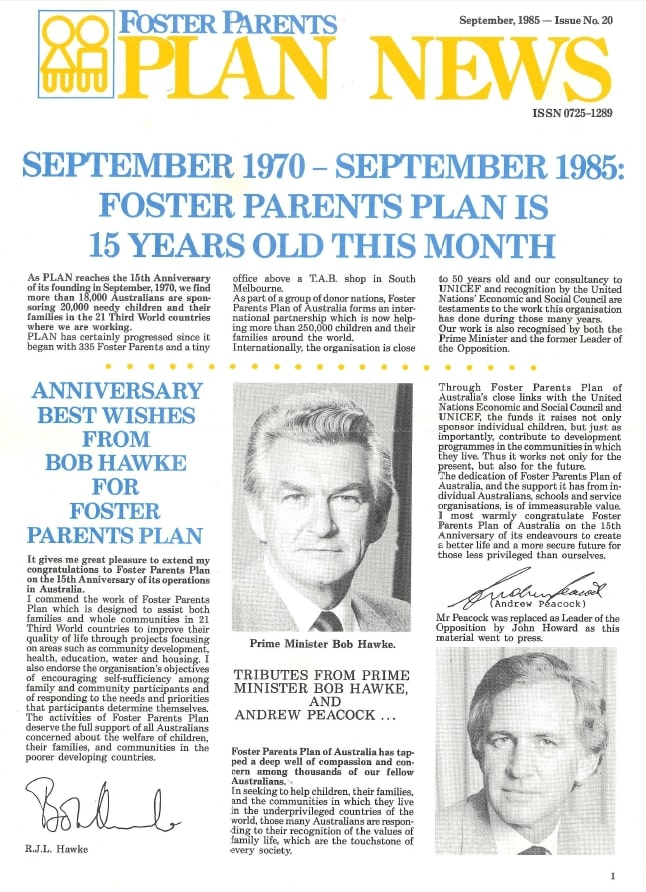
Foster Parents Plan
“You could say that Plan created the child sponsorship model. The very earliest children from the Spanish Civil War were sponsored by American and British people and wrote letters to each other and the model of child sponsorship really grew from there.” Ian reflects.
“I think one of the biggest challenges that Plan and a lot of global organisations faced was the way we approached child sponsorship in the 70s and early 80s was more of a hand out to children and their families. It was quite charitable, but it wasn’t developmental. Community development was seen as way to empower local communities rather than make them dependent. And so during the late 80s and 90s we had to adopt a community development approach and help that community to help themselves. That was a big change for Plan International but thankfully we went through that process and now we pursue community development at every turn.”
The ‘Plan Digest’ excerpts in this piece are part of a treasure trove of letters, booklets and photos our long-term supporters Sue and Doug Hair have shared with us from their time as supporters of the organisation.
What’s fascinating for us is not only the way the world and our approach to it has changed, but the way we talk to our supporters has changed too. Even the name ‘Foster Parents PLAN’, born from the idea that “children who have lost all personal ties are encouraged to feel the existence of a personal friend rather than a vague dispenser of charity,”[5] was a bit jarring as we evolved from supporting displaced children in ‘colonies’ to children as part of families and communities.
Children are at the heart of everything we do.
“We’d always worked communities, but to put children at the centre, ask their advice and to engage them in the projects was a big change that started to happen around 2002.” Ian explains as we talk about the change Plan International has undergone in his time here.
“The adoption of the child centred community development approach, putting children at the centre, was a challenging one because institutionally, Plan International staff and Plan International management felt they know what was best. But listening to the children we got new ideas about things to be done. Now, when you visit a Plan project, you sit down and you talk to children and you really engage with them and their families. I’ve worked in other agencies who do wonderful work and help children a lot, but you know when I worked there I didn’t sit down and talk to children, I talked to parents and I talked to teachers and I talked to elders – they would say what was right for the children, and what inspires me about Plan International is children get a voice.
“On top of this we adopted a much stronger child rights approach and these two things, child centeredness and child rights really affected our programs.”
Advocating for change
“Another difficult decision for the organisation was to embrace advocacy.” Ian tells us.
“We had always prided ourselves on being a ‘doing’ organisation and to learn that advocating on behalf of children is just as important as doing things ourselves or with the community was a challenge. But we’ve seen now what impact we can have by advocating. We helped make child marriage illegal in many countries. We’ve pushed back the practice of female genital mutilation in others; we have introduced new ways that governments can help their communities by improving schools and school management through our advocacy work. So we really believe that advocating for people, speaking up on behalf of people is as powerful as ‘doing things’.”
More harm than good?
Recently a group of our staff organised a movie night to watch Poverty.inc, a critique of the work of NGOs in places like Haiti in the aftermath of the 2010 quake, creating a system of dependency. It was challenging viewing. Feeling opportunistic, we asked Ian to help affirm why we do what we do, which was just as important for us, working for an organisation that we’re passionate about as it would be for you, our supporters.
“I think the important thing for any agency is to be self-aware and to be a learning agency.” Ian responded.
“I’ve spoken earlier about Plan International realising that just simply doing charity all the time is not the solution, we had to move to community development. That was an important shift, a piece of self-learning. We then learnt in the early 2000s that you have to recognise the agency of children and give them voice within projects and that was again Plan learning and leading.
“There are some serious critiques of the aid sector and its role in developing countries and I’m open to the critiques. But the reality is that if you visit villages where you see children suffering from poverty, malnutrition, a lack of education, it’s about finding the best way to help them. It’s better to be engaged and trying to do good than ignoring their situation or turning a blind eye. One thing about aid agencies is that they are present with the children, they are walking along-side the children trying to improve their lives, we don’t always get it right but it’s better than not being present.”
The role of women
Recently we launched our new purpose, which includes a special focus on equality for girls. Importantly, women have been strong leaders for Plan International since the organisation’s beginning.
“Women played a very big role in Plan International’s foundation.” Ian recalls. “The very first program director was a woman by the name of Esme Odgers from Sydney. She went over to help during the Spanish Civil War so right from the beginning women were in the frontlines of our work. It’s a little known fact that one of our first international CEOs was a woman, way back when in the 50s and 60s. So strong women leaders have always been a part of Plan International’s history. More recently we’ve institutionalised gender equality; we work hard not just to have women as the occasional leader but as equal leaders across the organisation. We’re looking very carefully at how women in management are given opportunities and it’s wonderful that we now have again a female global CEO, that’s a return to the past if you like. I think it’s fantastic.”
What does the future hold for us, and for children?
“There are a couple of things that really excite me about Plan’s future,” Ian tells us. “One is our new purpose, which maintains the advancing of children’s rights, but adds on the need to drive for gender equality.
We know that the big piece of unfinished business in the world is for girls and women in developing countries to have equality. We don’t arrive unless boys and girls arrive together.“I’m also seeing more and more how young people who have come up though Plan International’s support are moving into leadership themselves. In some places we have sponsorship alumni who organise themselves to do charitable and philanthropic work, we have people who have been working with Plan International who go onto political leadership and government leadership and I just think what really excites me is what this new generation of young people will be able to do if they’re given the right support.”
What struck us, reading old issues of ‘Plan Digest’ and letters from country offices, is the raw honesty with which they presented the challenges and chances they faced. That didn’t mean they weren’t optimistic, or hopeful for the future, but that they trusted their supporters to understand the complexities that come with working in new places, in a changing world. That’s why this isn’t a list of our greatest achievements over the last 80 years, though with your support we have enabled young people to do exceptional things. Instead it’s a chance for us to remember that in a world where global challenges can look increasingly overwhelming, we have come incredibly far in 80 years, and we’ve learnt a lot. We’ll keep learning, and adapting, and we’d like to bring you with us, because it’s only if we’re willing to learn and grow as a global community, that we can create real change.
The most important thing 80 years has shown us is the great potential of children, as they take on leadership roles in their communities and we can move on to new ones and take new learnings with us each time. We’re excited for a future where we’re no longer noticed nor needed, one where children and young people everywhere can learn, lead, decide and thrive. With your support here and now, we know we can make it happen.
[1] Molumphy, Henry D. For Common Decency: The History of Foster Parents Plan. Foster Parents Plan International, Inc. 1984, p. 103
[2] Ibid., 108
[3] Ibid., 133
[4] Ibid., 183
[5] Ibid., 30













